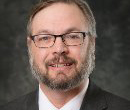
Dean Adrienne Minerick and the College of Computing are pleased to announce that Leo Ureel, Computer Science Lecturer and Ph.D. student, is this week’s Deans’ Teaching Showcase. Leo is also coordinator of the College of Computing Learning Center (CCLC) in Rekhi Hall and faculty advisor to the Computer Science Learning Committee in McNair Hall.
Most notable among his accomplishments, Ureel’s student-centric efforts are increasing retention and diversifying the cohort of first-year Computing students. Further, his work, in coordination with many other valuable members of the College of Computing, has increased the visibility of Michigan Tech and the College of Computing, both on campus and in the community, and contributed substantially to sustained enrollments in Computer Science and other College of Computing programs.
“What becomes apparent immediately when thinking about Leo’s contributions is how much Leo cares about and invests into his student’s learning,” says Dean Minerick. “Student success is at the heart of all that he does.”
Ureel’s work has provided him the opportunity to develop rich collaborations with researchers across the U.S. and in the U.K., Europe, and Africa, and he recently led an ITICSE working group of international researchers examining first year student experiences in CS.
Ureel teaches CS 1121 and CS 1122 courses, primarily to first year students, in which he works to broaden students’ views of computing, ground them in a programming language, and teach them problem solving skills. His research has been supported by NSF, Google, and NCWIT.
Ureel’s nomination emphasizes in particular his innovative and effective teaching of the entry-level programming classes in Computer Science, for which Ureel has developed a WebTA tool that gives students near real-time feedback on their programming code.
“My classrooms are hands-on learning environments where I combine small hands-on projects with blended learning techniques to engage students and provide individual feedback” Ureel explains. “I’ve developed a software system, WebTA, that provides students with individualized feedback on their code while they are working on it – even when I am personally unavailable. (For example, at 2:00 a.m. when students are working on their programming assignments!)”
“This engages students in the following programming practice: design, code, receive feedback, reflect, and repeat. The more I can engage the students in these tight cycles of programming and reflection, the better they learn to program.”
Ureel’s adds that his research efforts focus on a constructionist approach to introductory computer science that leverages code critiquers to motivate students to learn computer programming. The critiquer systems engage students in test-driven agile development methods through small cycles of teaching, coding integrated with testing, and immediate feedback.
This interest in student success was one component of Ureel’s close collaboration with Linda Ott, chair of the Computer Science department, in a project funded by the National Center for Women and Information Technology (NCWIT). As part of the collaboration focused on first-year student retention, a structure was developed to more effectively place students in their first programming course.
“By improving the placement of students based on their previous programming experience, both students new to programming and those with experience are more satisfied and more successful in their first programming course at Michigan Tech” according to Dr. Ott. “Leo is constantly thinking about ways to engage students in programming”.
Ureel is also part of a student and faculty team that regularly hosts community outreach and workshops for middle and high school students like Code Ninjas, Copper Country Coders, and numerous other programs.
“My work with K-12 outreach activities, such as Code Ninjas and Copper Country Coders, benefits both the K-12 students, who are learning to program, and Michigan Tech undergraduate students, who volunteer as K-12 mentors,” Ureel says. “The undergraduate students benefit from the teaching process; learning more about computer science as they
strive to articulate basic computer principles in simple language and entertaining memes for the K-12 students.”
Ureel’s success teaching students with no coding experience also sparked the pilot of a foundational computing course for non-majors at Michigan Tech. Ureel was the key thought leader driving course structure and content for CS 1090, Computational Thinking, a course for non-Computing majors that teaches computing fundamentals using the Python language.
“I am teaching the course in the context of several problem domains, including Big Data, Machine Learning, Image Processing, Simulation, and Video Game Design,” Ureel says. “As students tackle problems in these domains, I introduce the Python language structures required to construct a solution. Teaching programming in the context of larger problem domains gives students a way to ground their learning in practical applications.”
The course, which could help instill computational thinking across campus, is being piloted this semester with students from outside the College of Computing. Designed to be compatible with the College Board AP Computer Science Principles course, the CS 1090 pilot is expected to be expanded through IDEA Hub continuation efforts.
Ureel also leads the College of Computing Learning Center (CCLC), which has pivoted in a couple of ways over the last year, in step with the College of Computing. A cadre of 20 outstanding student coaches from both the Computer Science and Computer Network and System Administration majors have transformed the CCLC into an inclusive learning hub for all CC majors and courses, with students from across campus seeking out the CCLC. The number of students utilizing CCLC services has increased steadily over the past few years.
Ureel also worked closely with Dr. Nilufer Onder (CS) to incorporate into CCLC services an upper-level Student Academic Mentors (SAM) program that Dr. Onder developed and spearheaded in Computer Science courses. Their vision is to expand the SAM program under the umbrella of the CCLC, increasing access and courses supported.
And finally, in response to the recent COVID-19 pandemic, Ureel and his coaches have creatively and effectively coordinated the transition of CCLC services to an online format.